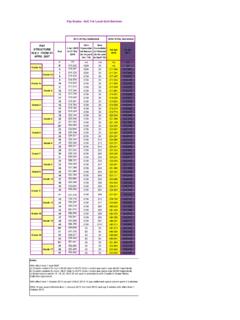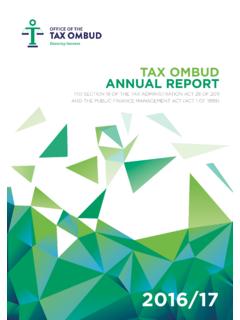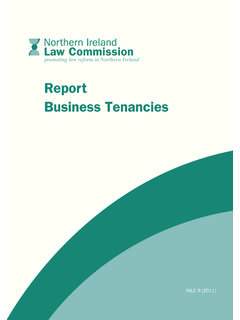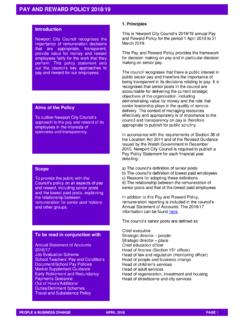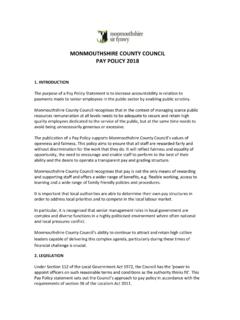Transcription of Guidance for Schools on Voluntary Funds - …
1 Guidance for Schools on Voluntary Funds This Guidance was reviewed and agreed by the Financial Governance & Audit working Group of the Schools ' Forum on 17 December 2012. January 2013. Definition A Voluntary or unofficial fund is defined as Any fund (other than those of the Council) which exists for the purposes of a school and is established under the authority of the Governors of a College or school . This includes monies collected from students or pupils for activities arranged by the school . Such Funds are also sometimes referred to as Non Public Funds . Introduction Many Schools choose to operate an unofficial fund covering a wide range of activities such as school trips, fund raising events, tuck shops and sale of school uniform.
2 The objectives of these Funds are supportive of the broader activities of the Schools . The Funds are controlled by the Governing Body who are responsible for policy. It is generally the case that school staff have responsibility for the day to day operation of such Funds and they should report regularly to the Governing Body. Where Funds are held in an unofficial fund , and are not combined with the normal school Funds , the provisions of the Charities Act 2011 apply. This Guidance note is compiled to provide Guidance on the governance and use of these unofficial Funds . It is a summary of relevant legislation and other requirements and is not directed at PTA or other Funds not held and controlled at the school . Background and Legislation Background information and the main pieces of legislation that relate to school Voluntary Funds are as follows (note that this list is not exhaustive): Croydon Scheme for Financing Schools , Section 5: Income Ofsted Keeping Your Balance, Standards for Financial Management in Schools , Section L.
3 The Charities Act 2011. The Charities Commission website: The Auditing Practices Board : Practice Note 11 The Audit of Charities in the United Kingdom Section 30 and Schedule 6 of Finance Act 2010. Schools Financial Value Standard, Question 22. Good Governance A Code for the Voluntary and Community Sector Requirements of the Charities Act and other regulations There are certain key requirements of the Charities Act and other regulations that will apply to Schools and must be complied with, which are summarised under the following headings: Registration and Compliance with the Act Founding statements and public benefits'. Trustees Disallowed expenditure Retention of records, annual report and audit 1. Registration and Compliance with the Charities Act Charities whose gross income does not exceed 5,000 or which are exempt Charities (refer to Schedule 3 of the Charities Act 2011) are not required to register with the Charities Commission.
4 All other charities are required to register with the Charities Commission. (The Charities Act specifically exempts foundation and Voluntary Schools , as well as any institution established for the general purposes or in connection with a foundation or Voluntary school .). Regardless of whether it has to register with the Charities Commission, all charities are required to comply with the Charities Act. 2. Founding statements and public benefits'. The governing documents of charities establish the purpose and constitution of each charity. To be a charity an organisation must have purposes or ('aims') all of which are exclusively charitable; a charity cannot have some purposes which are charitable and others which are not.
5 It must be clear what benefits to the public arise from carrying out a charity's aims. The Charities Commission Guidance states that, 'Public benefit' is the legal requirement that every organisation set up for one or more charitable aims must be able to demonstrate that its aims are for the public benefit if it is to be recognised, and registered, as a charity in England and Wales. This is known as 'the public benefit requirement'.. Thus, each Voluntary fund should have published aims, which demonstrate a public benefit'. In the case of Voluntary Funds , the public benefit' would be for the benefit of the pupils. Any benefit to individuals other than the pupils should be incidental. Charities are broadly exempt from direct tax on their income where expenditure is applied for a charitable purpose and therefore if transactions are outside the objects, or these involve significant benefit to the donor ( tainted' donations), there may also be tax implications.
6 In addition such transactions may give rise to a need to report the matter to the charity regulator. 3. Trustees Trustees of charities, and thus Voluntary Funds , are required to comply with the Good Governance A Code for the Voluntary and Community Sector. The Code is based on six key principles describing how an effective board provides good governance and leadership: 1. understanding their role;. 2. ensuring delivery of organisational purpose;. 3. working effectively both as individuals and a team;. 4. exercising effective control;. 5. behaving with integrity;. 6. being open and accountable. In this regard, Trustees are responsible for: 1. where a particular function is delegated to staff or third parties, monitoring the performance of the delegated function and clearly setting out the scope and limits of the delegated authority.
7 2. acting in accordance with the charity's governing document, in particular, the income and property of the charity must be applied for the purposes set out in the governing document and, in the case of any restricted fund , within the particular trusts attaching to that fund , and for no other purpose;. 3. acting reasonably and prudently in the charity's interests only and without regard to their own private interests;. 4. not deriving remuneration or benefit personally from the charity unless legally permitted to do so;. 5. maintaining proper accounting records and preparation of accounts required by the regulatory regime under which they operate;. 6. being able and willing to give time to the efficient administration of the charity and the fulfilment of its trusts.
8 In addition, trustees are required to have regard to the regulators' Guidance on how charities meet the public benefit requirement. The trustees for a school Voluntary fund would need to be nominated by the Governors and should include a treasurer. 4. Disallowed expenditure Expenditure which is not in line with the aims of the Voluntary fund is not allowed. In particular, all expenditure should be for the public benefit arising from the Voluntary fund 's aims and any benefit to another party should be incidental. The Charities Act also specifies that expenditure should not include any gratuities, unless approved by the Charities Commission. 5 Retention of records, annual report and audit Records: The Charities Act states that the charity should ensure that accounting records are kept in respect of the charity which is sufficient to show and explain all of the charities transactions.
9 For most Voluntary Funds , these accounting records would normally consist of an income and an expenditure record. The standards for Voluntary Funds need to be as rigorous as those for the administration of the school 's delegated budget. Parents, pupils and other benefactors are entitled to receive the same standards of stewardship for the Funds to which they have contributed. Annual report: An annual report and statement of accounts is required to be compiled for all charities, detailing the activities and transactions for the year. Where income for the Charity is lower than 250,000 the charity may elect to prepare a receipts and payments account' and a statement of assets and liabilities'. Thus, for Voluntary Funds it is expected that an annual statement of receipts and payments is prepared.
10 As the only assets and liabilities of a Voluntary fund would normally consist of the bank account and cash holdings, these should also be included with the annual statement of receipts and payments. Audit: The Charities Act requires that the accounts of each charity, where gross annual income exceeds 25,000, are annually audited by a competent person. The Act does not specify who should audit the accounts where annual gross income is less than 25,000. However, the Ofsted keeping your balance' document does specify that the accounts should be certified by an auditor completely independent of the school . SFVS provides further Guidance , stating that very small Funds could be audited by a suitable individual familiar with the principles of accountancy rather than necessarily a qualified accountant.







